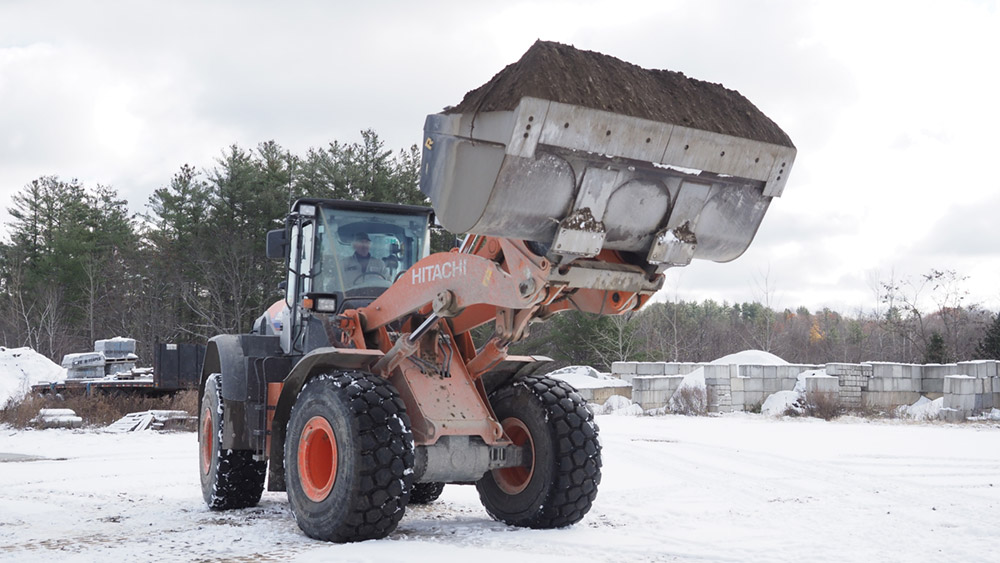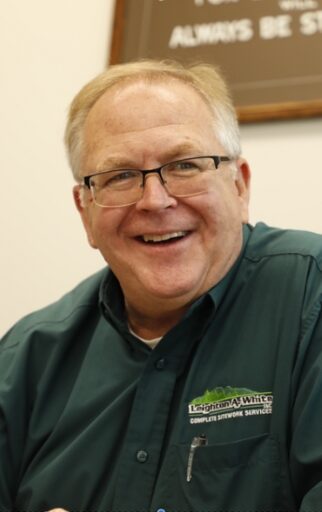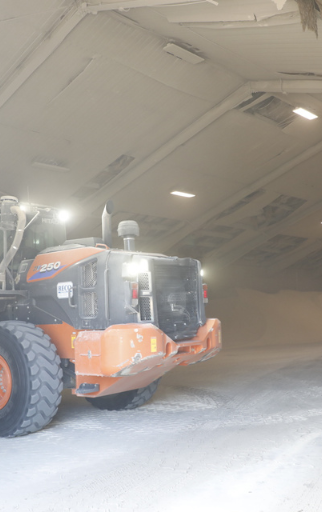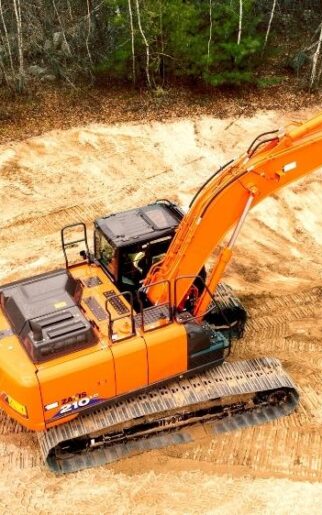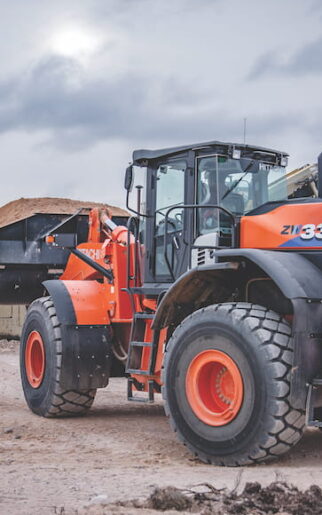J.D. Raymond Transport expands into concrete market
When J.D. Raymond Transport acquired Haley Construction, they needed dependable, rugged equipment to expand into the concrete crushing market. They chose to replace the existing equipment with Hitachi wheel loaders, a decision based on the breakout force, visibility and operator comfort of the Hitachi ZW180 and ZW220. But it was the strong dealer relationship that sealed the deal.
The history
In 1999, John Raymond founded J.D. Raymond Transport with a single truck and trailer. He began by hauling sludge and waste from Massachusetts to Maine. In the years that followed, he grew the business by adding trucks and owner-operators and expanding the field of materials they produced.
Today, J.D. Raymond Transport is focused on producing and transporting its own materials such as bark chips, mulch and firewood. Raymond was looking to expand the business again in early 2020 and set his sights on acquiring Haley Construction, a Maine-based transit mix concrete manufacturer. He was particularly interested in one of this 85-year-old business’ divisions, Redi-Rock of Central Maine, which produces small and large wall blocks that are all approved for municipal construction by the state Department of Transportation.
In April 2020, J.D. Raymond Transport acquired Haley Construction, now known as Haley’s. The three Haley’s concrete plants in Sangerville, Farmington and Hartland, Maine, were recently supplemented significantly with the purchase of another plant in Monmouth, Maine. Raymond brought on Tyler Erickson, a friend of the family, as general manager of Haley’s, and a few months into the acquisition it was time to replace the three wheel loaders used to move materials for concrete production.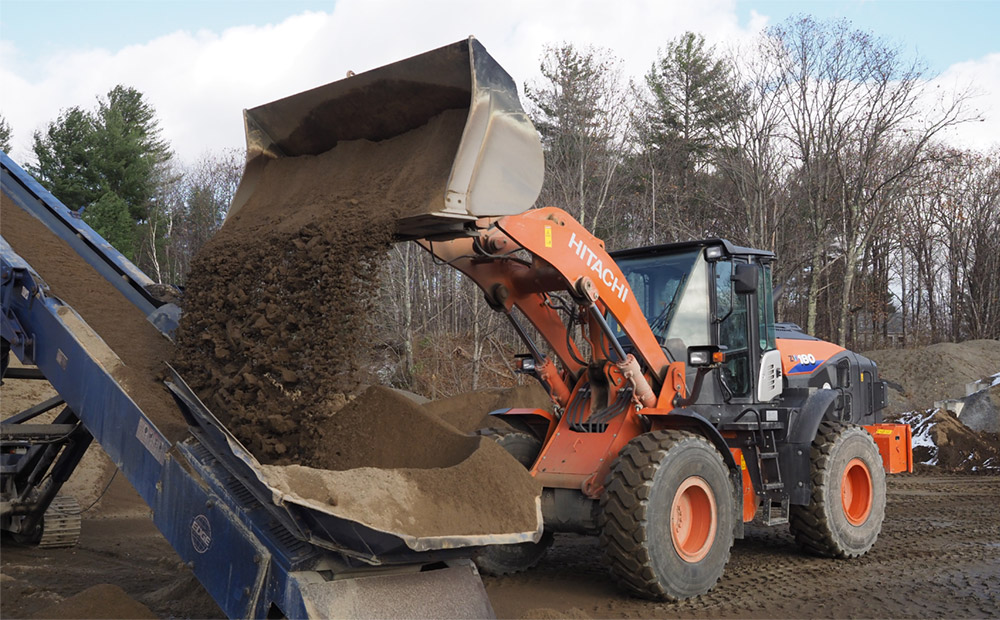
Changing gears
“These were our mainline loaders for plants in Monmouth, Farmington and Sangerville,” Erickson explains. The company was considering Hitachi and two other competitor products before purchasing the loaders.
Haley’s first demo’d the Hitachi ZW180-6 and, because they wanted a larger machine for the Sangerville plant, they also tried out the Hitachi ZW220-6. Erickson says operators leaned toward Hitachi; in particular, the operators said they appreciated the comfort and feel of the machines. The final decision came down to the Hitachi’s excellent access to the engine and service points and good visibility from the cab.
“I like the way they dig. It goes right into a pile of stone the same as sand — it slides right in, smooth and easy,” operator Reginald Page says. “You just fill the bucket and back away. It has really good traction; it’s heavy and balanced enough to hold the back end down when the bucket is full. And it’s got great visibility.”
Erikson says the operators reported that the Hitachis had better breakout force and more engine power. “And we actually saved money by going with Hitachi. It was a no-brainer at that point.”
With some of the competitor machines, “you always felt like you were going in blind. You can’t see what you’re doing very well, especially loading trucks,” Erickson says. “The Hitachis offer great visibility. It’s a good, comfortable cab, there’s plenty of power, there’s great controls, and I like the speed of the hydraulics,” he adds.
Raymond also got in and tried out the Hitachi Dash-6 wheel loaders to give his stamp of approval. “I liked the visibility, I liked the power, I liked the ergonomics and the way it felt — it’s a pretty rugged machine. It’s a really nice machine,” he says. Ultimately, Haley’s opted to lease two Hitachi ZW180s and one ZW220 specifically for Sangerville, which is the company’s only rock-crushing operation.
The Hitachi loaders offer great visibility. It’s a good, comfortable cab, there’s plenty of power, there’s great controls, and I like the speed of the hydraulics. – Tyler Erikson, general manager of Haley Construction.
Going the extra mile
In this case, the decision to go with Hitachi wheel loaders was also dependent on the service provided by the dealership, Frank Martin Sons, which has branches in Fort Kent and Madison, Maine.
That service is supported by ConSite, Hitachi’s reporting and analytics system that monitors operational performance of the loaders. “ConSite allows us to be proactive on the service side,” says Kris LePage, manager of the Frank Martin Sons Madison branch and an outside salesman. “We can see hours on machines, and we can see trouble codes sometimes even before they know about them.”
“Service is the name of the game,” he continues. “I always say that I make the first sale, but it’s parts and service that come behind me and sell the rest.” The dealership handles all scheduled maintenance and any problems that arise utilizing their mobile service trucks.
“Sales-wise, Kris put more into this than any other salesman,” Erickson says. “The service and the work that these guys put in has been second to none, including anybody I’ve dealt with in any area of this industry. Kris followed up, was here to answer questions and was all over it, so the service side of Frank Martin Sons was great from the start.”
LePage — who started out as a heavy equipment operator and then worked as a technician before getting into sales — spends much of his time on the road traveling out to see customers, many of them remote. “I have a beautiful office where I get to work,” LePage says about the company truck where he traverses the Maine countryside on his way to see clients.
Forging ahead
“We’re very happy with the Hitachi machines. We’d certainly consider Hitachi if we need more,” Raymond says. Haley’s, which produced 60,000 yards of concrete in 2019, easily surpassed that amount for 2020.
The Hitachi loaders helped support that increased productivity.
Haley’s recently installed a parking lot wall at Puritan Medical Products, which produces COVID-19 testing swabs. “We just did a big wall for Puritan. It was a huge project, and we sold all the blocks for this one wall and it wraps all around the parking lot. We’ve had some awesome work this year,” Erickson says.
Even in a difficult economy, it’s all that Haley’s can do to keep up with demand. “Right now, our inventory for our blocks is across the board in the red.” Erickson notes. “I have salesmen that I basically can’t let them go out and sell because we can’t keep up with the orders that they’ve already taken. We’re extremely busy. Good news, for sure.”

